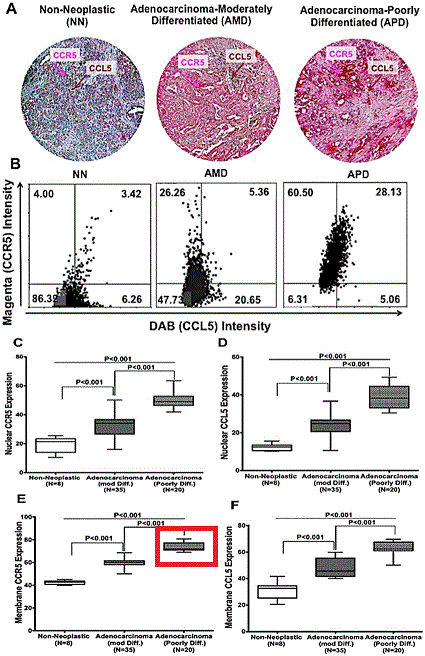(Total Views: 492)
Posted On: 01/04/2020 8:07:31 AM
Post# of 156888

Looks like Alex is not doing good.
https://www.cnn.com/2020/01/03/entertainment/...index.html
Alex Trebek has rehearsed his final 'Jeopardy' show
https://www.cnn.com/2019/12/30/entertainment/...index.html
Although at one point Trebek was in "near remission," he told ABC News in October he'd have to undergo chemotherapy again, since the cancer had returned.
"We may try a new protocol, a different chemo or something in the trial stage that is not chemotherapy," he said, adding, "I don't mind experimenting. I've got nothing to lose, so let's go for it."
I would guess his cancer has a high ccr5 expression level as seen in most PC.
https://www.nature.com/articles/s41598-018-19643-0
CCR5/CCL5 axis interaction promotes migratory and invasiveness of pancreatic cancer cells

https://www.jimmunol.org/content/196/1_Supplement/51.3
abstrast
Unfortunately, all we have currently as evidence is preclinical studies and a phase1/phase2 trial started( but prior chemo isnt allowed), which is so early with human testing, I don’t believe would be enough to convince anyone in his group he trust to advise him to at least get some testing for ccr5, ctc, etc. Besides, they probably get all kinds of people contacting them with all kinds of treatment advise, so picking a ccr5 antagonist among is like a needle in a haystack.
From first paper link above,
and another
https://www.jimmunol.org/content/182/3/1746
Disruption of CCR5-Dependent Homing of Regulatory T Cells Inhibits Tumor Growth in a Murine Model of Pancreatic Cancer
https://www.cancer.gov/about-cancer/treatment...28&r=1
CCR2 / CCR5 Antagonist BMS-813160, Nivolumab, Gemcitabine Hydrochloride, and Nab-Paclitaxel in Treating Patients with Borderline Resectable or Locally Advanced Pancreatic Cancer
But this is a good image of things they might try.
https://www.futuremedicine.com/doi/full/10.22...-2018-0156

https://www.cnn.com/2020/01/03/entertainment/...index.html
Alex Trebek has rehearsed his final 'Jeopardy' show
https://www.cnn.com/2019/12/30/entertainment/...index.html
Although at one point Trebek was in "near remission," he told ABC News in October he'd have to undergo chemotherapy again, since the cancer had returned.
"We may try a new protocol, a different chemo or something in the trial stage that is not chemotherapy," he said, adding, "I don't mind experimenting. I've got nothing to lose, so let's go for it."
I would guess his cancer has a high ccr5 expression level as seen in most PC.
https://www.nature.com/articles/s41598-018-19643-0
CCR5/CCL5 axis interaction promotes migratory and invasiveness of pancreatic cancer cells

https://www.jimmunol.org/content/196/1_Supplement/51.3
abstrast
Quote:
Despite recent advancements in understanding of pancreatic cancer (PC) molecular features and their impact on clinical behavior, PC systemic therapy decision-making is still guided by a constellation of clinico-pathological features, which are derived from histo-pathological analysis of primary PC tissues. Chemokines and their corresponding receptors play a crucial role in metastasis and organ specific homing of cancer cells in different cancers including PC. CCL5 is a homeostatic chemokine acts through its cognate receptor, CCR5. Here, we have provided the evidence that CCR5 and CCL5 are significantly elevated in both PC cell lines (BxPC-3, MIA PaCa-2 and AsPC-1) and clinical samples. Flow cytometric analysis of PC cell lines (BxPC-3, MIA PaCa-2 and AsPC-1) show significantly higher expression of CCR5. These findings were further confirmed at mRNA expression level by real-time PCR analysis. To determine the clinical significance of CCR5 expressed by PC cell lines, pancreatic cancer tissue microarray was stained for CCR5 and CCL5. Aperio scan scope scanning system was used to numerically analyze immuno-histochemical staining of CCR5 and CCL5. Our results show significantly (p < 0.001) higher expression of CCR5 and CCL5 in cancerous tissues compared to normal pancreatic tissues . These data demonstrate both biological and clinical significance of CCR5 and CCL5 expression that may contribute to PC metastasis.
Unfortunately, all we have currently as evidence is preclinical studies and a phase1/phase2 trial started( but prior chemo isnt allowed), which is so early with human testing, I don’t believe would be enough to convince anyone in his group he trust to advise him to at least get some testing for ccr5, ctc, etc. Besides, they probably get all kinds of people contacting them with all kinds of treatment advise, so picking a ccr5 antagonist among is like a needle in a haystack.
From first paper link above,
Quote:
The CCL5 activation of PC cells expressing CCR5 increased their invasive potential, while treatment with CCR5 inhibitor maraviroc inhibited the CCL5 activation.
and another
https://www.jimmunol.org/content/182/3/1746
Disruption of CCR5-Dependent Homing of Regulatory T Cells Inhibits Tumor Growth in a Murine Model of Pancreatic Cancer
https://www.cancer.gov/about-cancer/treatment...28&r=1
CCR2 / CCR5 Antagonist BMS-813160, Nivolumab, Gemcitabine Hydrochloride, and Nab-Paclitaxel in Treating Patients with Borderline Resectable or Locally Advanced Pancreatic Cancer
But this is a good image of things they might try.
https://www.futuremedicine.com/doi/full/10.22...-2018-0156

